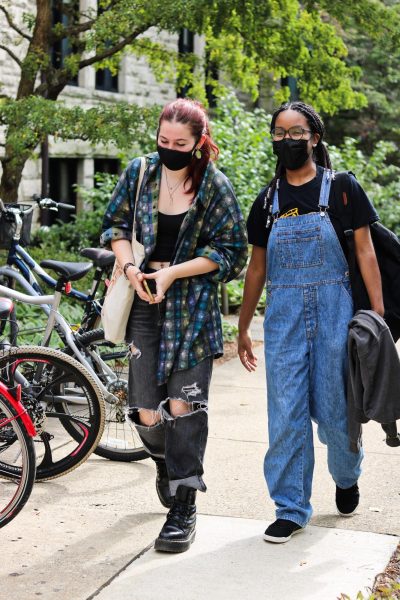Lost Items, Lost Patience
Before anything else, it’s important to note that initially we hadn’t planned on writing this article. We only agreed to do so to shed light on the nature of our Senate work, and because our early attempts to collaborate with the administration were so disheartening that we cannot simply move on and forget what happened. We also delayed publication to give some time and space to the team currently working hard to return belongings to students. However, it’s time to share our piece.
Since early March, we have been working with College fourth-year Michelle Liu to investigate the loss of student items following the abrupt departure from campus in spring 2020. While we have recently seen significant improvement, our initial attempts to coordinate with the administration on the situation did not go well. It took several months to get to a semi-functional point of working together, and while it has been over a year since the COVID-19 pandemic forced us off of campus, hundreds of students have yet to be reunited with their belongings. For everything the College eventually got right in this process, much went wrong, and our voices were too often stifled.
Although the two of us have coordinated a lot on this issue, Michelle has been working on this project the longest. Several months ago, she reached out to Student Senate asking for help investigating this situation. She shared her copious notes from months of emailing administrators and seeking answers. Once we received Michelle’s email, we sent out a “lost items update” survey in February to gather more information from students whose items were lost. After receiving a few responses, we met with two administrators to clarify the situation. We got some answers, but we ultimately came out of the meeting with more questions. This first meeting was also when we realized that most people working on this issue were doing so part-time and with different perceptions of the situation. We understand being overworked with limited resources, thanks to our Senate work. With that in mind, consistent information and some honesty aren’t hard to provide. We’re expected to give the same bare minimum of transparency and would appreciate that courtesy in return.
Once it was clear that the administration was not legitimately prioritizing the return of items, we changed our approach. Arman and Michelle visited the 13 storage trailers behind Willard Court and spoke with the workers there to assess the situation. With their input and our responses from the Google Form survey, we identified three main issues: a lack of transparency between the administration and student body; workers not having a list of rooming assignments from previous semesters; and a glaring shortage of labor assigned to this task. The questions we encountered from students were numerous — many didn’t know that their “lost” items were likely stored in the trailers, South Dance Studio, or Asia House. Others had no idea who to reach out to about their missing items, had reached out and never gotten a response, or didn’t know they could be compensated for missing items. We attribute this to ineffective communication from the administration. As far as the shortage of labor, it shocked us that only two workers were sorting through the belongings of an estimated 500 students. This was, again, over a year after students left campus in March.
After our visit, we generated a list of several suggestions, including writing up an FAQ so students would be more informed, asking ResEd to share room assignments with the workers so they could connect labeled items with their owners, developing an online platform with pictures of the trailers to help students identified items, creating a temporary stipended student position to address the labor issue, and having designated times for students to sort through trailers. As we came up with these suggestions and several others, we attempted to share them with administrators. Our goal was to help implement these solutions, but instead we were consistently redirected, blatantly ignored, or told that there was not time to meet with us. The information we received from the administrators supposedly in charge of this process was often incorrect. We were told, for example, that there were six to eight trailers full of items, a claim we only debunked when we went to visit by ourselves. We cannot emphasize enough the frustration of watching this issue being mismanaged for over a year, being constantly told that our help was not needed, and knowing that the College had yet to empty a single trailer.
By this point, we were more than sick of this cycle of never-ending incompetence and redirection. With few good options left, Arman and Michelle went to the trailers for a second time. On this visit, it was clear that things were improving. The workers had a list of student housing with phone numbers, so they could finally reach out to students once items were found. A more senior member of staff was there helping out. While we were glad to see this, we found the timing curious — while our emails were ignored, a week or two later we found the very solutions that we suggested being implemented. Regrouping after the visit, we sent a candid email to then-Vice President and Dean of Students Meredith Raimondo, detailing a process we said was “tremendously under-manned, miscommunicated, and badly organized.” It was at this point that we started being taken seriously, and a team of administrators led by Assistant Vice President of Student Life Adrian Bautista was assembled to try and return the majority of the items to students by the end of the spring semester. We released our FAQ to the student body, with input from Director of Special Events and Student Life Operations Jessica Bayer-Crissman. The College sent out an email to the student body, informing students about how to get their items back, and we have also been able to meet with administrators to finally have our suggestions heard.
While we are relieved to no longer be going in circles, it doesn’t change the unnecessary longevity and insanity of this whole process. The excessive delay in returning belongings, as well as the many times students reached out and never heard back, led to many giving up on ever getting their belongings back. Additionally, only two staff members ever apologized for the College’s errors, and neither of them were even responsible for what happened. Some other administrators insinuated that after so many months of us stressing and struggling to be heard, we should forgive and forget.
Unfortunately, it seems that a large part of our job as senators has become bothering people until they take us seriously. However, we only ever resort to critique after first being stonewalled. Our combativeness is not a choice, but rather learned behavior. It’s truly no surprise, then, that senator turnover is so high. We are tasked with immense initiatives, and we have limited power to tackle any of them alone. When months of work can dissipate simply because we never got a proper email response, senators quit. All we ask, instead, is that we are allowed to help.




